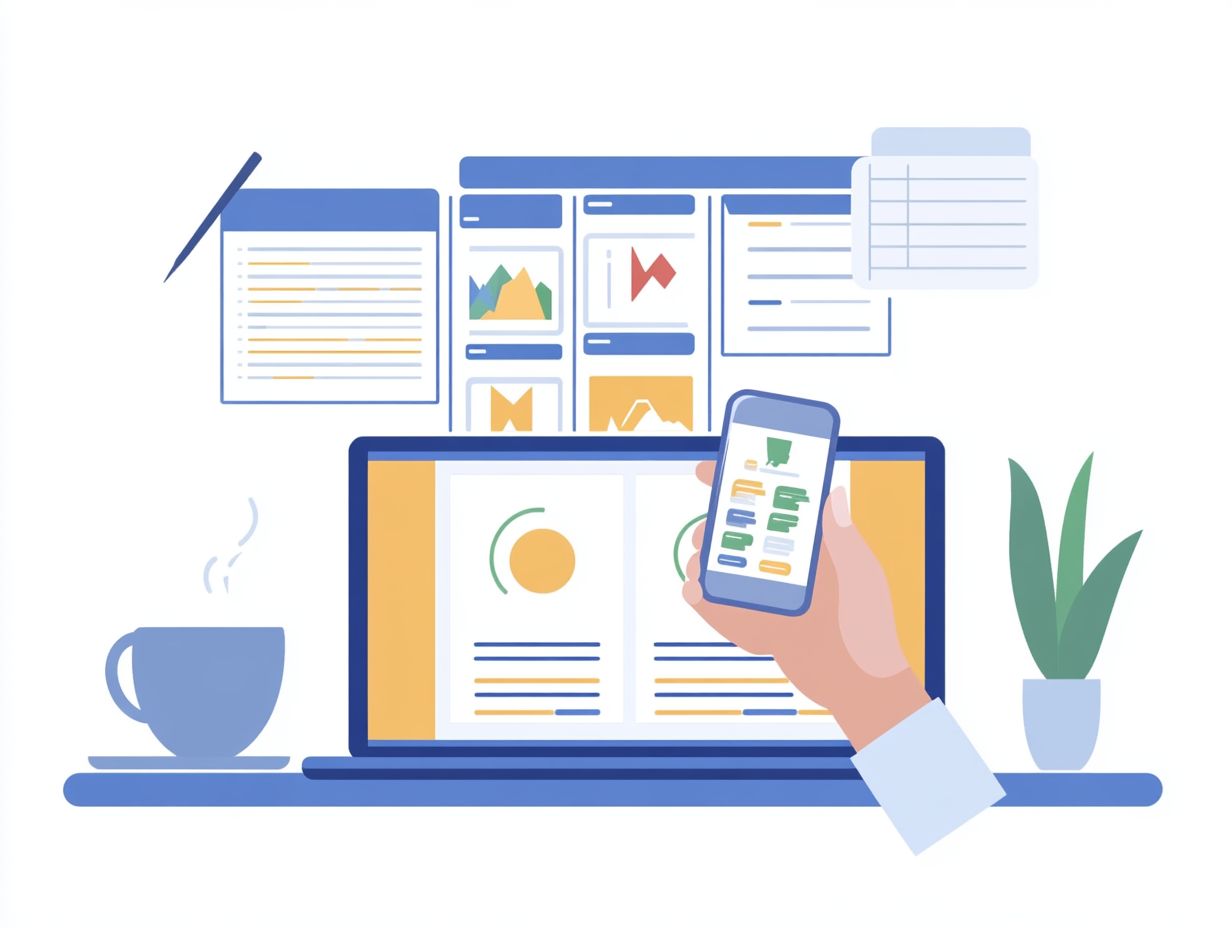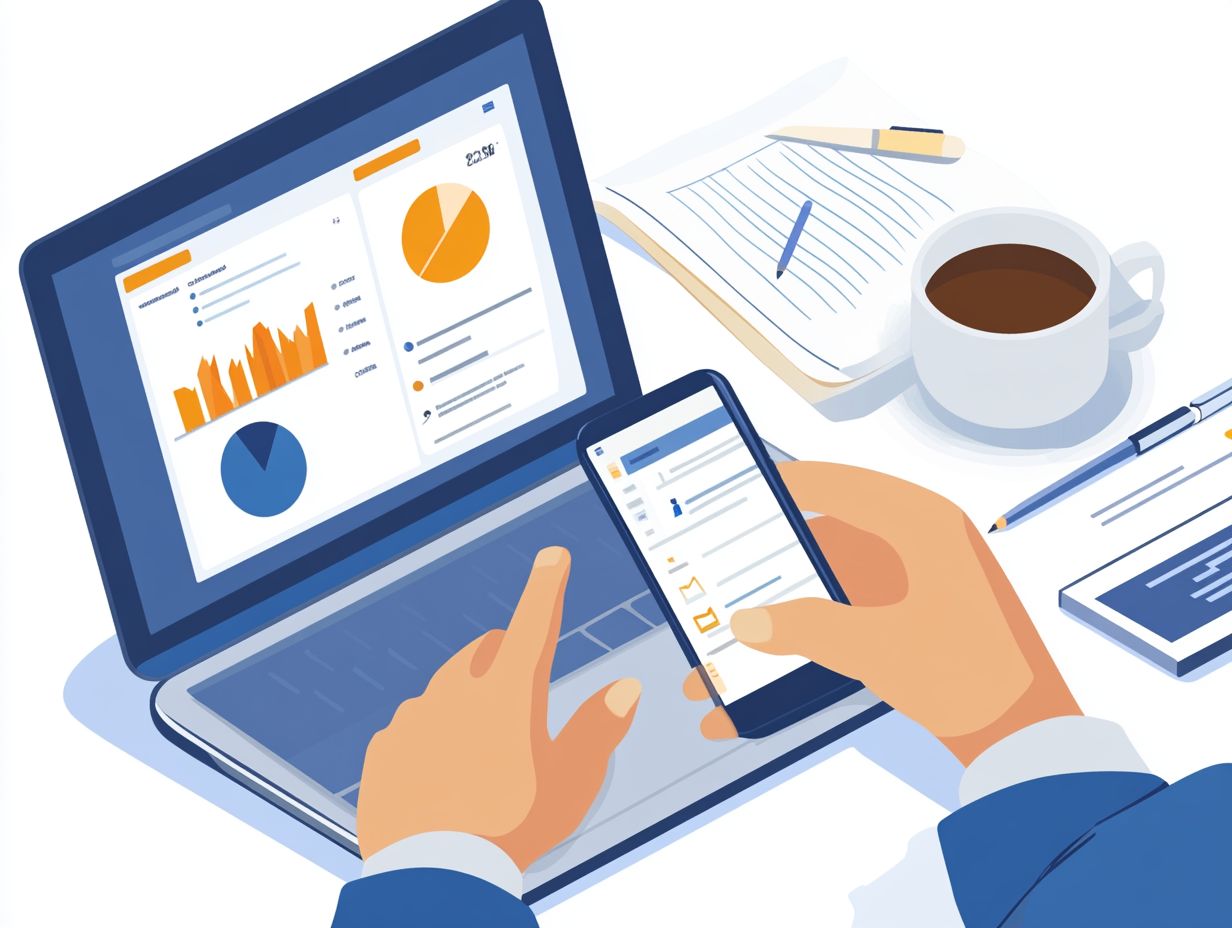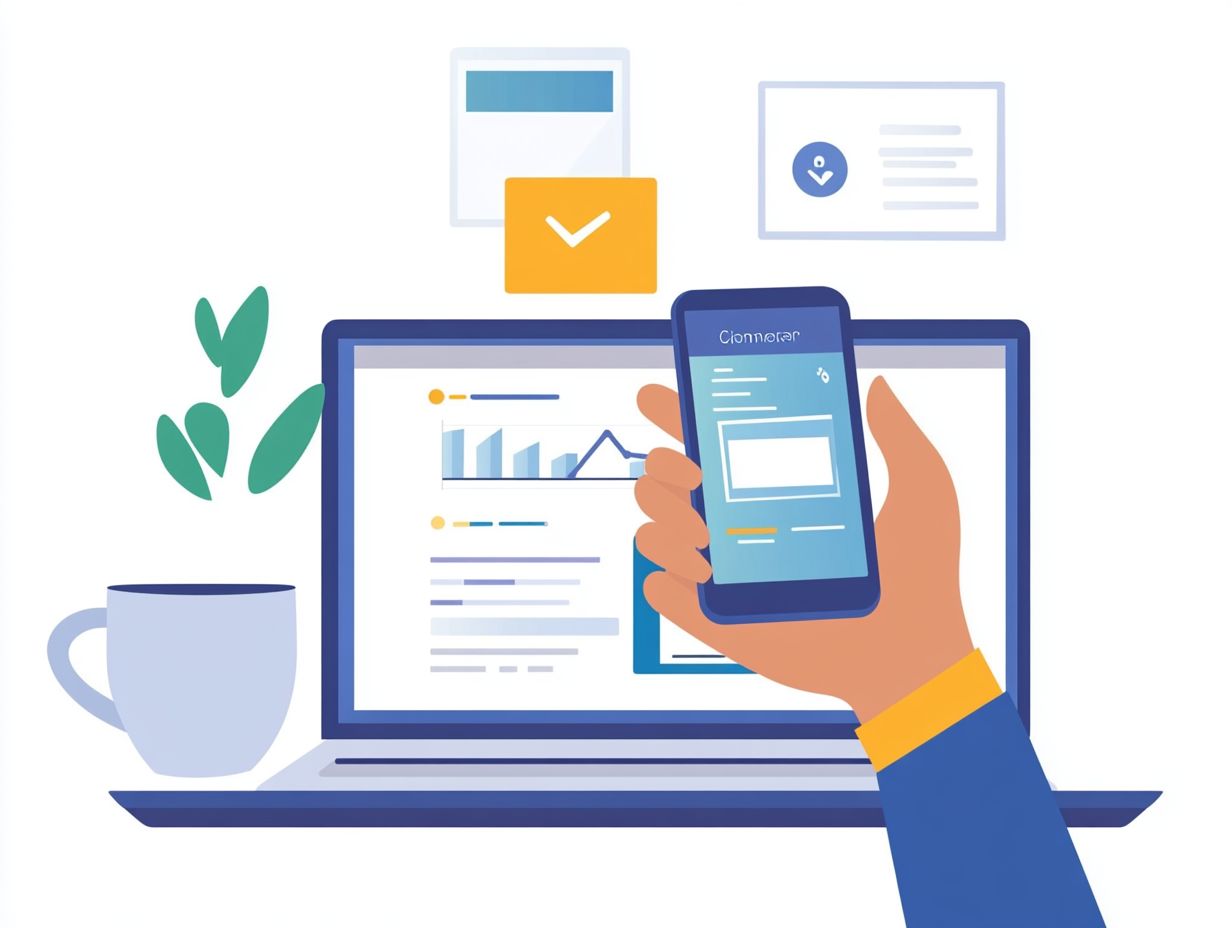How to Integrate Mobile Solutions with CRM
In today s dynamic business landscape, integrating mobile solutions with Customer Relationship Management (CRM) systems is revolutionizing the way you operate.
This exploration delves into the myriad benefits of this integration, ranging from streamlining processes to enhancing customer experiences. It also tackles the challenges you may face, such as technical limitations and data security concerns.
You will find a comprehensive roadmap for successful integration, best practices for ongoing maintenance, and valuable insights on selecting the right tools.
Dive in now to discover how to supercharge your business strategy!
Contents
- Key Takeaways:
- Benefits of Integrating Mobile Solutions with CRM
- Challenges and Considerations for Integration
- Steps to Successfully Integrate Mobile Solutions with CRM
- Best Practices for Maintaining Integration
- Frequently Asked Questions
- What is the benefit of integrating mobile solutions with CRM?
- What are some common challenges when integrating mobile solutions with CRM?
- How do I choose the right mobile solution to integrate with my CRM?
- Can I integrate multiple mobile solutions with my CRM?
- What are some best practices for integrating mobile solutions with CRM?
- How can I get started with integrating mobile solutions with my CRM?
Key Takeaways:

- Integrating mobile solutions with CRM streamlines processes and saves time and costs.
- It enhances customer experiences, increasing satisfaction and loyalty.
- Successful integration requires assessing needs, choosing the right tools, and ongoing training.
What are Mobile Solutions and CRM?
Mobile solutions and Customer Relationship Management (CRM) systems are crucial tools for modern business leaders aiming to elevate customer interactions and streamline operations.
CRM, or Customer Relationship Management, helps businesses manage interactions with customers.
Cloud-based technologies are changing the game. You can now use tools like VoIP, AI, and APIs to connect various communication channels.
VoIP, or Voice over Internet Protocol, allows phone calls using the internet. These innovations not only simplify inbound and outbound calls but also provide features such as call recording and automated SMS workflows, ensuring a seamless experience for both your sales reps and customers.
Real-time data access helps you build better relationships with customers. Your sales reps can manage interactions easily.
By integrating CRM with platforms like Zapier, you can automate routine tasks, saving time and reducing errors. This level of automation boosts your operational efficiency and allows your team to concentrate on nurturing strong customer relationships.
The integration capabilities also help you gather and analyze data, offering valuable insights into customer behavior and preferences. This means you can tailor your offerings more effectively, resulting in increased satisfaction and loyalty.
By combining mobile solutions and CRM, you create a connected experience that delights customers. This approach sets you apart from the competition and drives your success!
Benefits of Integrating Mobile Solutions with CRM
Integrating mobile solutions with CRM systems presents a wealth of advantages, including how to integrate social media into your CRM, greatly enhancing customer satisfaction while streamlining your business processes.
This integration enables real-time data access, allowing you to cultivate deeper relationships with your customers by enabling your sales reps to manage interactions with ease.
With features like shared inboxes and advanced automation, you not only improve communication history tracking but also foster team alignment and collaboration. The result? Happier customers and a significant boost in the efficiency of your daily operations.
Streamlining Processes and Improving Efficiency
Streamlining your processes by integrating live chat with your CRM can lead to remarkable improvements in efficiency, allowing you to use your time more effectively.
By implementing automated workflows and CRM phone integrations, your sales teams can minimize confusion and reduce duplicate work, leading to better management of call logs and customer interactions.
This powerful synergy within your CRM ensures that your sales reps can focus on what truly matters cultivating relationships with customers.
With automated workflows, you experience a seamless transition of tasks that not only saves time but also ensures that nothing slips through the cracks. Your call logs become organized and accessible, making it easy for your team to track essential information and follow up promptly.
CRM phone integrations enhance communication by linking calls directly to customer profiles, providing valuable insights during conversations.
All these elements work together harmoniously to elevate overall productivity, allowing your teams to manage their time wisely and concentrate on driving growth through meaningful customer engagement.
Enhancing Customer Experience
Enhancing your customer experience is essential in today’s competitive market. Integrating helpdesk solutions with your CRM can significantly elevate the quality of interactions with customers.
By utilizing tools that provide shared context, monitor call quality, and incorporate AI assistance, you can ensure your customer service interactions are efficient and personalized. This careful focus fosters trust and loyalty, ultimately leading to improved satisfaction and retention.
In a landscape where customers expect immediate responses and tailored service, leveraging mobile platforms enables seamless communication across various channels. This integration enhances engagement by allowing for real-time feedback and quick resolutions to inquiries.
When you combine mobile solutions with robust CRM systems, you can anticipate customer needs and preferences. This helps in crafting experiences that resonate on a deeper level.
The strategic use of AI can analyze past interactions, allowing your team to respond with contextual awareness. This not only streamlines communication but also significantly boosts customer confidence and satisfaction.
As a result, you position yourself with a distinct competitive edge satisfied customers are far more likely to advocate for your brand.
Challenges and Considerations for Integration

Integrating mobile solutions with your CRM can unlock a wealth of benefits. For those looking to enhance their strategies, how to integrate your CRM with social media is a key consideration. It’s vital to acknowledge the potential challenges and considerations that come with it.
Technical knowledge is essential to ensure your existing systems harmonize seamlessly with new solutions. This knowledge helps navigate the array of integration options available.
Prioritizing data security and privacy is crucial for protecting customer information within cloud-based environments. This focus on security is not just a checkbox; it s a critical aspect of the integration process that demands attention.
Technical Limitations and Compatibility
Technical limitations and compatibility issues can present considerable challenges when integrating mobile solutions with CRM systems. By ensuring that APIs (Application Programming Interfaces) and webhooks are utilized correctly, you can navigate many of these hurdles.
It s essential to be aware of potential issues stemming from varying technology stacks. These can disrupt seamless communication between different platforms.
If these technical barriers aren t addressed, you might encounter data discrepancies, latency, and incomplete data transfers. Leveraging APIs helps create standardized interfaces that enhance compatibility across systems.
Meanwhile, webhooks act as effective tools for real-time communication, providing instant updates and minimizing synchronization delays.
Being proactive in assessing your existing systems’ architecture and identifying integration bottlenecks is crucial. This approach helps cultivate a comprehensive and efficient channel for information exchange.
Your goal should be to enhance operational workflows and improve user experiences while upholding data integrity.
Data Security and Privacy Concerns
Data security and privacy concerns are paramount as you integrate mobile solutions with CRM systems. This is particularly important in a landscape where customer data faces heightened scrutiny.
It’s crucial to implement robust security protocols in cloud-based solutions to safeguard sensitive customer information. Ensure compliance with regulations to protect this data.
Prioritizing data privacy is essential for fostering trust and maintaining strong customer relationships. To achieve this, utilize:
- Encryption techniques to keep customer data safe
- Multi-factor authentication for added security
- Regular security audits to ensure compliance
These measures collectively create a formidable defense against data breaches. Adhering to compliance standards like GDPR and HIPAA is vital for protecting customer data and reducing risks.
These actions not only shield your business from potential legal repercussions but also enhance your reputation. Customers are more inclined to engage with brands that demonstrate a commitment to data security.
Act now to protect your customer’s data! Transform your security protocols from mere legal necessities into a competitive advantage in today s data-driven marketplace.
Steps to Successfully Integrate Mobile Solutions with CRM
Successfully integrating mobile solutions with your CRM demands a strategic approach that encompasses several essential steps, including integrating CRM with existing systems.
- First, assess your specific needs and goals. This allows you to pinpoint the right tools and platforms that align with your objectives.
- Once you ve completed this assessment, establish a structured implementation process to ensure a seamless integration that maximizes effectiveness for everyone involved.
Assessing Business Needs and Goals
Assessing your business needs and goals is foundational for effective CRM integration. It allows you to clarify what you aim to achieve through mobile solutions.
By identifying specific objectives like enhancing customer satisfaction or optimizing time efficiency you can tailor your integration strategies to address these priorities directly. This focused approach ensures that the solutions you adopt deliver the best possible outcomes.
The importance of this initial assessment cannot be overstated; it sets the stage for successful implementation. For instance, if you recognize a need to streamline communication channels, you might choose a CRM system that emphasizes real-time collaboration tools.
This decision enhances operational efficiency and boosts team morale and responsiveness to customer inquiries. Failing to define these critical objectives can lead to misaligned strategies and wasted resources.
Establishing a clear roadmap is essential for maximizing your CRM potential and achieving the results you desire.
Choosing the Right Tools and Platforms

Choosing the right tools is crucial to supercharge your CRM integration! Evaluate various CRM options and cloud-based solutions to find tools that align best with your operational needs.
This careful choice boosts functionality and enables your teams to fully leverage the advantages of their CRM systems.
When selecting tools, conduct a thorough analysis of their technical capabilities and compatibility with your existing processes. Seamless integration with current software is paramount to avoid disruptions.
Aligning these tools’ functionalities with your broader business goals fosters efficiency and productivity. Prioritize user-friendliness to facilitate team adoption and reduce training time.
By concentrating on these elements, you can make informed decisions that enhance customer interactions and support long-term growth.
Implementation and Testing Process
The implementation and testing process is pivotal for seamlessly integrating mobile solutions with your CRM systems. It ensures every component operates as intended before going live.
A structured approach allows you to conduct thorough testing and troubleshooting, identifying any issues that might impact user experience. Gathering user feedback during this phase is crucial for fine-tuning the integration.
Start by clearly defining your objectives and requirements. This clarity guides your development team throughout the process.
Once the integration is complete, carry out both functional and user acceptance tests to confirm that the system functions correctly and meets user needs.
Engaging in iterative testing cycles fosters continuous improvement, enabling you to make adjustments based on real-time insights. By prioritizing these testing phases, you enhance functionality and significantly boost overall user satisfaction, leading to higher adoption rates of the new technology.
Best Practices for Maintaining Integration
To achieve a successful CRM integration, adhere to best practices that keep your systems effective and relevant over time. Regular updates and maintenance are essential for ensuring smooth integration and addressing any challenges that may arise.
Offering ongoing training and support for users greatly enhances their comfort and proficiency with the integrated systems. This ultimately elevates the quality of customer service interactions.
Start your integration journey today and transform your customer relationships!
Regular Updates and Maintenance
Regular updates and maintenance are essential for preserving the long-term performance of your customer relationship management (CRM) tools. This enables your business to adapt to evolving needs and technologies.
By establishing a consistent schedule for updates, you can tackle any bugs and enhance system performance. This proactive approach enriches the overall user experience and significantly improves the efficiency of your customer service interactions.
When you prioritize these updates, you ensure that your CRM system aligns with the latest industry standards and security protocols, safeguarding sensitive customer data.
Users will appreciate a more intuitive and responsive interface, which encourages engagement and fosters loyalty. The ability to quickly integrate new features keeps your business competitive in an ever-changing market.
Regular check-ins reduce downtime and empower your team for smoother customer interactions.
Training and Support for Users
Providing adequate training and support for users is vital for the success of connecting CRM tools, as it directly impacts engagement and productivity.
By offering comprehensive training sessions and easily accessible support resources, you enable your team to use the integrated systems effectively. This support boosts confidence and ensures you leverage these tools to their fullest potential.
In addition to traditional classroom-style training, consider incorporating hands-on workshops, e-learning modules, and live webinars to accommodate various learning preferences and schedules.
Advanced techniques like role-playing scenarios or gamification can transform the learning experience into something engaging that truly motivates users.
After the training, maintaining consistent follow-up support such as access to a dedicated helpdesk or a robust knowledge base ensures your team feels supported while navigating challenges.
By strategically combining these methods, you facilitate smoother system adoption and cultivate a culture of continuous improvement and innovation within your team.
Frequently Asked Questions

What is the benefit of integrating mobile solutions with CRM?
Integrating mobile solutions with CRM allows for real-time access to customer data, improved communication and collaboration, and increased productivity for sales and marketing teams. To achieve these benefits, it’s important to learn how to manage CRM integrations effectively.
What are some common challenges when integrating mobile solutions with CRM?
Some common challenges include compatibility issues between different mobile and CRM platforms, data security concerns, and the need for proper training and support for users.
How do I choose the right mobile solution to integrate with my CRM?
When choosing a mobile solution, consider factors such as compatibility with your current CRM system, relevant features that align with your business needs, and pricing and support options. Seeking recommendations from other businesses in your industry can also be helpful.
Can I integrate multiple mobile solutions with my CRM?
Yes, it is possible to integrate multiple mobile solutions, depending on the compatibility and capabilities of your CRM system. However, carefully evaluating and prioritizing each integration, such as using CRM integrations to drive sales growth, can help avoid unnecessary complexity and potential technical issues.
What are some best practices for integrating mobile solutions with CRM?
Best practices include thoroughly researching and testing the integration before implementation, providing proper training and support for users, regularly monitoring and updating the integration, and ensuring compliance with data privacy and security regulations.
How can I get started with integrating mobile solutions with my CRM?
To get started, identify your business needs and goals for integrating mobile solutions with CRM. Research and compare available options, and consult with your CRM provider and IT team for guidance. For those looking to expand capabilities, consider integrating CRMs with cloud storage solutions. If needed, seek assistance from third-party experts or consultants.
Ready to boost your CRM integration? Let s get started today!






